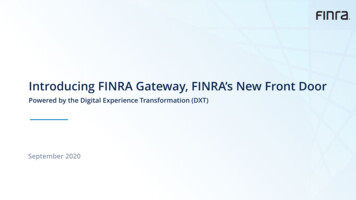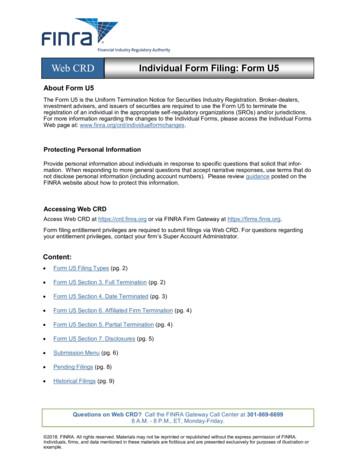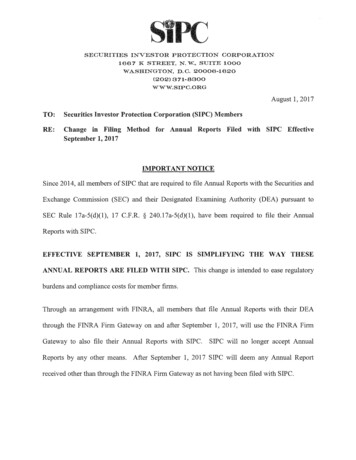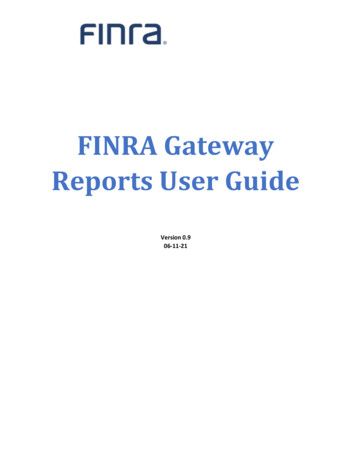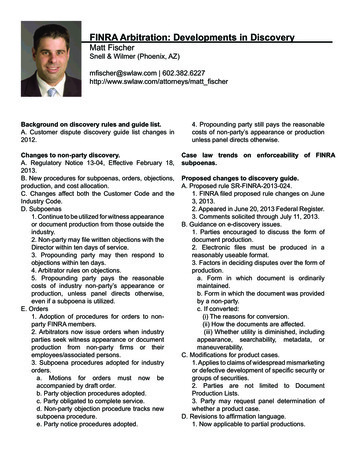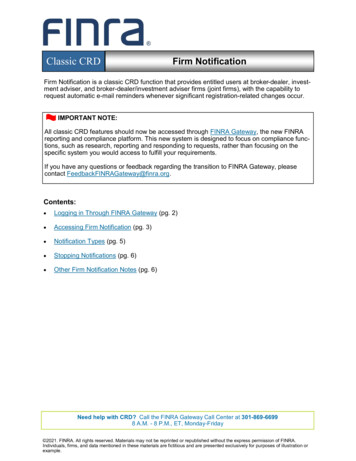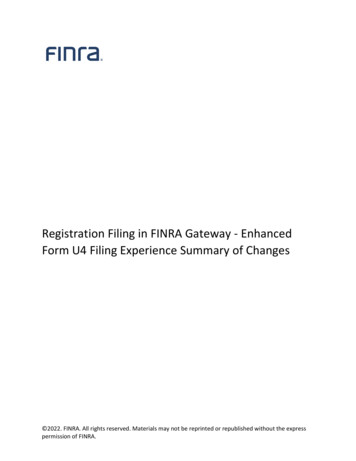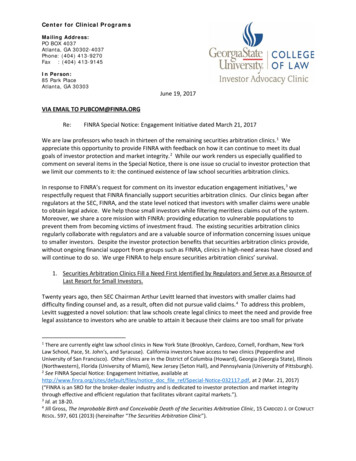
Transcription
Center for Clinical ProgramsMailing Address:PO BOX 4037Atlanta, GA 30302-4037Phone: (404) 413-9270Fax : (404) 413-9145In Person:85 Park PlaceAtlanta, GA 30303June 19, 2017VIA EMAIL TO PUBCOM@FINRA.ORGRe:FINRA Special Notice: Engagement Initiative dated March 21, 2017We are law professors who teach in thirteen of the remaining securities arbitration clinics. 1 Weappreciate this opportunity to provide FINRA with feedback on how it can continue to meet its dualgoals of investor protection and market integrity. 2 While our work renders us especially qualified tocomment on several items in the Special Notice, there is one issue so crucial to investor protection thatwe limit our comments to it: the continued existence of law school securities arbitration clinics.In response to FINRA’s request for comment on its investor education engagement initiatives, 3 werespectfully request that FINRA financially support securities arbitration clinics. Our clinics began afterregulators at the SEC, FINRA, and the state level noticed that investors with smaller claims were unableto obtain legal advice. We help those small investors while filtering meritless claims out of the system.Moreover, we share a core mission with FINRA: providing education to vulnerable populations toprevent them from becoming victims of investment fraud. The existing securities arbitration clinicsregularly collaborate with regulators and are a valuable source of information concerning issues uniqueto smaller investors. Despite the investor protection benefits that securities arbitration clinics provide,without ongoing financial support from groups such as FINRA, clinics in high-need areas have closed andwill continue to do so. We urge FINRA to help ensure securities arbitration clinics’ survival.1. Securities Arbitration Clinics Fill a Need First Identified by Regulators and Serve as a Resource ofLast Resort for Small Investors.Twenty years ago, then SEC Chairman Arthur Levitt learned that investors with smaller claims haddifficulty finding counsel and, as a result, often did not pursue valid claims. 4 To address this problem,Levitt suggested a novel solution: that law schools create legal clinics to meet the need and provide freelegal assistance to investors who are unable to attain it because their claims are too small for privateThere are currently eight law school clinics in New York State (Brooklyn, Cardozo, Cornell, Fordham, New YorkLaw School, Pace, St. John’s, and Syracuse). California investors have access to two clinics (Pepperdine andUniversity of San Francisco). Other clinics are in the District of Columbia (Howard), Georgia (Georgia State), Illinois(Northwestern), Florida (University of Miami), New Jersey (Seton Hall), and Pennsylvania (University of Pittsburgh).2See FINRA Special Notice: Engagement Initiative, available athttp://www.finra.org/sites/default/files/notice doc file ref/Special-Notice-032117.pdf, at 2 (Mar. 21, 2017)(“FINRA is an SRO for the broker-dealer industry and is dedicated to investor protection and market integritythrough effective and efficient regulation that facilitates vibrant capital markets.”).3Id. at 18-20.4Jill Gross, The Improbable Birth and Conceivable Death of the Securities Arbitration Clinic, 15 CARDOZO J. OF CONFLICTRESOL. 597, 601 (2013) (hereinafter “The Securities Arbitration Clinic”).1
Securities Arbitration ClinicsComment on Special NoticeJune 19, 2017Page 2lawyers to take. 5 Pace opened the first law school securities arbitration clinic in 1997. 6 After Pace,twenty-three additional law school securities arbitration clinic were opened, at Fordham and Brooklyn(1998); Buffalo (1999); Duquesne (2001); University of San Francisco (2002); Albany, Cardozo, Syracuseand St. John’s (2004); Touro, New York Law School, and Northwestern (2005); Hofstra (2006); Cornell(2008); and University of Pittsburgh (2011). 7 Several clinics received seed funds from the FINRA InvestorEducation Foundation in the following years: Florida International, Howard, Suffolk, and Pepperdine(2009); Seton Hall and University of Miami (2010); and Georgia State and Michigan State (2012). 8Sixteen clinics remain today.Clinics provide legal representation to investors who are unable to obtain an attorney due to the size oftheir claim. Though each clinic has its own criteria for who they will represent, the clinics’ eligibilityguidelines “are designed to allow [securities arbitration clinics] to offer free legal services to clients whohave suffered losses from disputed transactions that have had a significant impact on their financialcondition and cannot afford to or do not have access to private representation.” 9 Our clients includeretirees, hairdressers, mail carriers, welders, schoolteachers, and librarians.Clinics provide a valuable service to FINRA and the industry in screening out claims that do not havemerit. In our collective experience, we find that the vast majority of investors who contact us do nothave a viable claim. 10 In such instances, we help them understand why a claim does not exist and whathappened within their account. We listen to them and give them an outlet that is not otherwiseavailable. This service undoubtedly reduces the number of unmeritorious claims filed. Moreover,because FINRA Dispute Resolution is not able to provide any legal advice to parties who ask legalquestions concerning their claims, FINRA often refers pro se parties to clinics for legal assistance. 11Screening non-viable claims out of the system and advising pro se parties provides an additional valuablebenefit to all participants in the securities arbitration arena.Whether or not clinics accept them as clients, the investors who reach out for assistance appreciatebeing able to talk about their situation and get answers. We are the last and only option for investorswho have lost less than 100,000. National news programs have highlighted our programs’ workId. at 601-602.Id. at 602.7Id. at 602-603.8Id.9See id. at 604. See also id. (describing typical criteria as “requir[ing] that the potential client: have a householdincome under 100,000; have a claim for damages of less than 100,000; have no major assets other than aprimary residence and a car; and exhaust other avenues for private legal representation.” Several clinics haveflexible criteria and evaluate matters on an individual basis to ensure that needy claimants have access toassistance.10See, e.g., Gross, The Securities Arbitration Clinic, at 608 (“During an academic year, Pace’s SAC (PIRC) handlesbetween twenty-five and fifty preliminary inquiries, investigates more than twenty cases in depth, and offersformal representation to approximately five to ten clients.”).11See FINRA, FINRA’s Dispute Resolution Process, available ion/p117486.pdf at 1 (“FINRA cannot offer legal advice or legalrepresentation to anyone.”).56
Securities Arbitration ClinicsComment on Special NoticeJune 19, 2017Page 3precisely because we fill such an important function. 12 Indeed, investors’ feedback and thank you notesspeak for themselves:“[W]e would like to express our sincere thanks for all the hard work both yourselfand the students put into our case. Your dedication and hard work has broughtthis stressful situation to an end. We understand the amount of work andresearch put into our case by the students and yourself in addition to the studiesthe students must complete each day [We] were not sure where to turn,however, your expertise and the knowledge of the students was of great value.”- Investor represented by Cornell 13“Thank you so much for the Investor Advocacy Clinic’s review of my situation.Though the outcome was not what I had hoped for, everyone has treated mekindly and with respect. It is wonderful that the State of GA offers this service tothe public.”- Investor whose matter was declined by Georgia State 14“We are very grateful for your representation of [our] claim before FINRA. Itwould not have been possible without your help. The interaction with thestudents was a delight. . Their hard work was obvious and much appreciated We are indebted to you and your students and thank you again for your effortson [our] behalf.”- Investor represented in simplified proceeding to judgment by Georgia State 15“I would like to express my sincere appreciation to you and the student attorneyswho worked on my claim against [my brokerage firm] I know that [all of you]spent an incredible amount of time and energy to settle this case, and I am wellaware that I would not have had the chance of getting any reparation from [mybrokerage firm] without the assistance of John Jay Legal Services. Your Clinicprovides an invaluable service to people like myself who are unable to retain anattorney either due to lack of funds or because the size of their case is not largeenough to make it feasible to retain outside legal counsel ”- Investor represented by Pace 16Securities arbitration clinics fill a crucial gap and ensure that all investors have someone to turn to ifthey have a problem with their account even if their claim is too small for a private attorney. Clinics are12See, e.g., NBC Nightly News, Frustrated Investors Get Assistance, available athttps://drive.google.com/open?id 0B6tLhfQksU5HNkNNQlNLSXUwUnM(May 30, 2009) (highlighting San Francisco clinic’s work helping investors with smaller claims).13See Cornell, Securities Law Clinic, available at /securitieslaw-clinic/index.cfm.14Original on file with Nicole G. Iannarone.15Original on file with Nicole G. Iannarone.16See Pace, Investor Rights Clinic, at 5, available ions/investorrightsclinic.html.
Securities Arbitration ClinicsComment on Special NoticeJune 19, 2017Page 4able to assist FINRA and the industry by ensuring investors receive competent advice about potentialclaims, and explanations about why claims may not be viable, thereby reducing the number of pro seclaims and filtering meritless claims out of the system.2. Securities Arbitration Clinics’ Investor Education Efforts are a Key Component of Their Missionsand Align with FINRA’s Investor Protection Goals.In addition to providing legal advice to small investors, clinics prevent vulnerable investors from harmthrough investor education and outreach. 17 For example, Pace authored the Investor’s Guide toSecurities Industry Disputes: How to Prevent and Resolve Disputes with Your Broker, a guide that aims tohelp “investors learn more about their legal rights and best practices for responsible investing, before adispute arises, and to gain an understanding of their options in case a dispute does arise.” 18 TheCardozo and Georgia State clinics are both working to create investor-friendly videos describing keyconcepts in investing and securities arbitration. 19 Several clinics provide links to investor education toolsand include investor guides on their websites. 20 Clinics maintain investor education blogs with regularcontributions from students breaking down complicated investing topics into easy to digest pieces. 21Clinic students write and publish scholarly articles related to securities arbitration. 22 Clinics regularlyprovide in-person educational presentations at high schools, libraries, community centers, and tovulnerable groups including members of the military, seniors, young professionals, and faithcommunities. 23 Northwestern even created an educational guide to help other law schools establish anNorthwestern, Guidelines for Establishing a Law School Investor Advocacy Clinic, at 11, available f(“Legal clinics exist not only to provide education for their students and to serve individual clients but also to reachout to the community-at-large.”).18Pace, the Investor’s Guide to Securities Industry Disputes, available 19See, e.g., Investor Advocacy Clinic Partners with Secretary of State Office on Investor Education, available rk-investoreducation/ (describing partnership between clinic and Georgia Securities Division “to enhance investor educationin Georgia”).20See, e.g., Cornell, Investor Protection Guide, available de.cfm;New York Law, Research Tools, available at http://www.securitiesclinic.org/research-tools/; Miami, InvestorResources, available at rces/; and Miami, Resources for BrokerClaims: Investor Rights Clinic, available at es-for-brokerclaims-investor-rights-clinic.21See GSU Blog, available at https://investoradvocacyclinic.wordpress.com/; Miami Blog, available athttp://investorrights.law.miami.edu/.22See, e.g., Pepperdine, Investor Advocacy Clinic Program, available ams/investor-clinic.htm.23See Cornell, Securities Law Clinic, available at /securitieslaw-clinic/ (“SLC students conduct seminars and provide educational materials to senior citizens groups and otherson how to avoid falling victim to investment fraud.”); Georgia State, Clinic Interns Present Investor Education toGSU ROTC Cadets, available at gsu-rotc-cadets/; Georgia State, Clinic Interns Engage in Outreach at Local RetirementCommunity, available at tirement-community-2/; Howard, Investor Justice and Education Clinic (IJEC), available at17
Securities Arbitration ClinicsComment on Special NoticeJune 19, 2017Page 5investor advocacy clinic. 24 Operating entirely independently from industry groups or financial motives,we find that our status as law school clinics op makes others trust the information we provide and opensdoors not available to others.3. Securities Arbitration Clinics Collaborate with Regulators.Due to the populations we serve, clinics are often the first to identify trends impacting small investors.We regularly collaborate with FINRA and the SEC and discuss problematic products and practices thatharm the most vulnerable investors. Fordham hosts a Securities Arbitration Roundtable every year thatbrings together clinic faculty, FINRA, and the SEC. A significant portion of the Roundtable is devoted toproviding feedback to regulators on processes and rulemaking priorities. Clinic directors answerregulators’ questions and describe trends, problematic products, and other issues that affect smallinvestors. Similarly, clinics have unique insight on FINRA and SEC rulemaking priorities as they impactsmall investors. Thus, many clinics are actively involved in drafting comment letters. 25 Some clinics e-and-education-clinic-ijec (“[S]tudents design, implement, andparticipate in at least one investor education and outreach program for the under-served investing communityeach semester.”); Seton Hall, Investor Advocacy Project, available athttp://law.shu.edu/About/News Events/Program Highlight/program-highlightspotlight.cfm?customel datapageid 3661 310035 (“In the past year, IAP students have conducted nearly twodozen seminars among diverse audiences throughout the state.”); St. John’s, Securities Arbitration Clinic, availableat clinic (“Students also conduct Investor Education Seminars inlocal public libraries and other community organizations”); Miami, IRC Provides Financial Education Services toSouth Florida Investors, available at each/fall-2012community-outreach/ (describing four investor outreach presentations to young adults and seniors); Pittsburgh,Securities Arbitration Clinic, available at /securities (“[T]heSecurities Arbitration Clinic also provides public education about investment fraud, with particular attention toinvestment schemes targeting PA residents and the elderly.”); San Francisco, Investor Justice Clinic, available w-clinics/investor-justice (“Students enrolled in the clinic alsolead investor education seminars at senior centers.”).24See Northwestern, Guidelines for Establishing a Law School Investor Advocacy Clinic, available f.25See, e.g., Cornell, Securities Law Clinic, available at securities-law-clinic/ (“Students have the opportunity to research and write on legal topics ofimportance to investors, including regulatory comment letters, amicus briefs and research articles.”); GeorgiaState, Investor Advocacy Clinic Helps Shape Regulation via Comment Letters, available / (“As partof its mission of serving regular investors, Georgia State Law’s Investor Advocacy Clinic regularly evaluates FINRArule proposals and submits comments.”); St. John’s, Securities Arbitration Clinic, available n-clinic (“students may write comment letters to the SEC and/orFINRA in response to requests for public comment on proposed rulemaking or other agency activity.”).
Securities Arbitration ClinicsComment on Special NoticeJune 19, 2017Page 6amicus briefs on issues that impact regular investors. 26 Many clinics also collaborate with stateregulators in addition to their work at the federal level. 274. Securities Arbitration Clinics Require Funding to Protect and Represent Small Investors.Securities arbitration clinics will not be able to continue their investor protection function withoutsupport. Many securities arbitration clinics began with or at some point in time received financialsupport from the FINRA Investor Education Foundation or state regulators. 28 Today, however, thesesources do not fund new or existing clinics. Moreover, other lines of funding that supported thesecurities arbitration clinics due to our status as a consumer protection resource have also beendiscontinued. As one example, earlier this month, the Attorney General prohibited the use ofsettlement funds and cy pres awards for third party groups in federal litigation, sources of past clinicfunding. 29 Unlike other types of law school clinics focused primarily on poverty law, securitiesarbitration clinics do not have access to outside funding sources despite the fact that our work oftenprevents aggrieved investors from becoming destitute.In 2013, Professor Jill Gross identified “maintenance of ongoing funding” as “perhaps the biggestchallenge to SACs” and feared that some clinics may close. 30 Unfortunately, Professor Gross’s fear hasbecome a reality: since her article was published, two more clinics closed (FIU and Michigan State). Intotal, out of the twenty-four clinics once in operation, only sixteen currently exist. 31 Three of the clinicsthat closed (FIU, Michigan State, and Suffolk) received seed grants from the FINRA Investor EducationFoundation. These closures represent a lost investment of 750,000, sums that could have reapedSee, e.g., Brief of Amicus Curie Investor Rights Clinic at Pace Law School, Stone v. Bear, Stearns & Co., Inc.,available at or-rights-clinic/13959 Brief of Amicus Curiae Investor Rights Clinic at Pace Law School.pdf (March 14, 2014); Cornell, Aboutthe Clinic, available dents [p]repare amicus briefs on investment and arbitration law in pending court cases.”); University ofPittsburgh, Securities Arbitration Clinic, available at /securities(Students “[p]repare amicus briefs on investment and arbitration law in pending court cases.”).27See Pittsburgh, Securities Arbitration Clinic, available cs/securities (clinic co-taught with Deputy Chief Counsel ofPennsylvania Securities Commission); Georgia State, Investor Advocacy Clinic Partners with Secretary of StateOffice on Investor Education, available at investor-education/ (Sept. 26, 2016).28See, Gross, The Securities Arbitration Clinic, at 602-603 (describing grants from NASD Foundation, New YorkState Attorney General’s Office, FINRA Foundation, and Pennsylvania Securities Commission).29See Prohibition on Settlement Payments to Third Parties, available at 26/download (June 5, 2017); Gross, The Securities Arbitration Clinic at n98 (describing cy presaward to Pace and their use as possible, yet limited, funding source for other clinics); Northwestern, Guidelines forEstablishing a Law School Investor Advocacy Clinic at 30 (“For continued maintenance of a clinical program, it maybe possible to obtain cy pres awards directly from state or federal court judges who control unclaimed funds fromclass action settlements or decrees.”).30See id. at 617-618, 621-622.31The eight closed clinics are Albany, Buffalo, Duquesne, Florida International, Hofstra, Michigan State, Suffolk,and Touro.26
Securities Arbitration ClinicsComment on Special NoticeJune 19, 2017Page 7greater returns if continued funding was available. 32 The surviving clinics require funding to “preventtheir not-so-inconceivable death.” 33Closing clinics burdens the already over-extended clinics in jurisdictions with other clinics. Thus, Miamihas a waitlist so long that it cannot add any more names to it, notwithstanding the significant demandfor its services. 34 For investors who reside in jurisdictions with no clinic, they may have nowhere toturn. Yet jurisdictions without clinics are not without investor claims. As of April 2017, FINRA’s DisputeResolution Statistics show that 45% of the filed cases (excluding all cases pending in Puerto Rico) are injurisdictions in which there is no clinic available to assist smaller investors. 35 The following illustratesthe location of the currently existing clinics:The declining number of clinics and lack of clinics in many jurisdictions may also contribute to a potentialinvestor protection issue identified by the Dispute Resolution Task Force in its 2015 report: theproliferation of non-attorney representatives (NARs). 36 Absent additional funding, more clinics mayclose, leaving a larger amount of investors without any channels for free, high-quality legal advice.See Investor Advocacy Clinic Program, available vocacy/index.html.33Gross, The Securities Arbitration Clinic, at 622.34As of February 2017, there are nearly as many arbitrations actions pending in Florida (560 active cases), as inNew York (563 active cases). See FINRA Dispute Resolution Statistics, available dispute-resolution-statistics.35See FINRA, Hearing Location Statistics, available at aringlocation-statistics (cases filed by hearing location). We excluded the 813 Puerto Rico cases from this calculation.36See FINRA Dispute Resolution Task Force, Final Report and Recommendations of the FINRA Dispute ResolutionTask Force (Dec. 16, 2015) at 52, available at task-force32
Securities Arbitration ClinicsComment on Special NoticeJune 19, 2017Page 85. FINRA’s Investor Education Engagement Initiatives Should Include Developing a SecuritiesArbitration Clinic Funding Model that Sustains and Grows Securities Arbitration Clinics.Because FINRA’s investor protection mission and the live-client representation and educationalfunctions of law school securities arbitration clinics align so closely, we respectfully request that FINRA’sinvestor education engagement initiatives include creating a funding model that sustains and growsclinics. This request is not without precedent. For example, in its 2015 report, the FINRA DisputeResolution Taskforce wrote that it “believes that an appropriate use of FINRA fines and penalties wouldbe funding of law school arbitration clinics and recommends FINRA consideration.” 37 Moreover, fundsmay be available for this purpose from both FINRA and the FINRA Investor Education Foundation. TheFINRA Investor Education Foundation’s 2015 Form 990 indicates net assets exceeding 74 million. 38 Inthat year, FINRA awarded 50 million to the Foundation. 39 FINRA’s 2015 annual report also noted thatits “financial position remains strong and highly liquid with approximately 2.3 billion of total assets,including 2.0 billion of cash and investments, and approximately 1.5 billion in equity.” 40 Successfulmodels for funding of law school clinics already exist. As one example, addressing similar needs in thecontext of unrepresented taxpayers, the IRS Office of the Taxpayer Advocate created a successful lowincome taxpayer clinic (LITC) grant program in 1999. 41 In its first year, that program “awarded grantstotaling less than 1.5 million to 34 entities located in 18 states and the District of Columbia.” 42 Almost20 years later, in 2016, the program has grown to fund “138 entities located in 49 states and the Districtof Columbia.” 43 To ensure sustainability of LITCs, the program requires that law schools match grantsdollar for dollar up to a maximum grant of 100,000. A similar program for securities arbitration clinicswould ensure the longevity of existing clinics and create capacity for new clinics in high need areas.ConclusionWe appreciate this opportunity to provide FINRA with feedback on its engagement initiatives. Westrongly urge FINRA and the FINRA Foundation to support all existing securities arbitration clinics toensure that this important investor protection mechanism does not contract any further and to provideadditional funding to expand securities arbitration clinics’ coverage so that all investors with small claimsreport.pdf (“The task force also heard complaints about poor performance by compensated non-attorneyrepresentatives (NARs) and doubts about whether they provide a service to investors The task force recommendsthat a study be conducted to determine how many jurisdictions allow NARs to represent customers in the FINRAforum, whether NARs provide a service to investors with small claims who otherwise would not be able to obtainrepresentation, and whether NARs are performing competently.”).37See id. at 52-53.38See FINRA Investor Education Foundation IRS Form 990 at p. 1, available 63/2015-200863779-0d6c4433-9O.pdf.39See FINRA 2015 Year in Review and Annual Financial Report, at 7, available athttps://www.finra.org/sites/default/files/2015 YIR AFR.pdf (“In February 2105, the FINRA Board of Governorsapproved a 50 million contribution to the FINRA Investor Education Foundation to provide continuing support forthe Foundation’s innovative research and education efforts.”).40Id. at 8.41LITC 2017 Grant Application Package and Guidelines, at 1-2, available at https://www.irs.gov/pub/irspdf/p3319.pdf.42Id. at 2.43Id.
Securities Arbitration ClinicsComment on Special NoticeJune 19, 2017Page 9have somewhere to go for legal assistance. We look forward to continuing our longstandingcollaboration. We would be pleased to provide any additional information to assist FINRA’s review ordevelopment of investor protection mechanisms to sustain securities arbitration clinics.Respectfully submitted, 44Nicole G. IannaroneDirectorInvestor Advocacy ClinicGeorgia State University College of LawJ. Samuel TenenbaumDirectorInvestor Protection CenterNorthwestern Pritzker School of LawElissa GermaineDirectorInvestor Rights ClinicElisabeth Haub School of Law at Pace UniversityTeresa J. VergesDirectorInvestor Rights ClinicUniversity of Miami School of LawElizabeth GoldmanDirectorSecurities Arbitration ClinicBenjamin N. Cardozo School of LawDavid Michael WhiteDirectorInvestor Advocacy ProjectSeton Hall University School of LawChristine LazaroAssociate Professor of Clinical Legal EducationSt. John’s University School of LawGary J. PieplesDirectorSecurities Arbitration and Consumer ClinicSyracuse University College of LawRobert TalbotDirectorInvestor Justice ClinicUniversity of San Francisco School of LawHoward S. MeyersDirectorSecurities Arbitration ClinicNew York Law SchoolAlice L. StewartVisiting Professor of LawSecurities Arbitration ClinicUniversity of Pittsburgh School of LawBruce SandersSupervising Attorney & Adjunct Professor of LawInvestor Justice & Education ClinicHoward University School of LawRobert A. UhlDirector, Founder and Adjunct ProfessorInvestor Advocacy ClinicPepperdine University School of LawThis comment letter contains the undersigned professors’ individual views and is not intended to and does notreflect the views of our respective institutions.44
Mailing Address: PO BOX 4037 Atlanta, GA 30302-4037 Phone: (404) 413-9270 Fax : (404) 413-9145 In Person: 85 Park Place Atlanta, GA 30303 June 19, 2017 . VIA EMAIL TO PUBCOM@FINRA.ORG . Re: FINRA Special Notice: Engagement Initiative dated March 21, 2017 . We are law professors who teach in thirteen of the remaining securities arbitration .

